We are pleased to announce the 2023 Association for Mormon Letters Awards finalists in film, podcast, and poetry. The final awards will be announced and presented on July 20, as part of the 2024 Association for Mormon Letters Virtual Conference. We will be announcing the other category finalists over the coming week. The finalists and winners are chosen by juries of authors, academics, and critics. The announcements include blurbs and author biographies, usually adapted from the creator and distributor websites.
Film
 Aliens Abducted My Parents and Now I Feel Kinda Left Out. Jake Van Wagoner, director. Austin Everett, screenwriter.
Aliens Abducted My Parents and Now I Feel Kinda Left Out. Jake Van Wagoner, director. Austin Everett, screenwriter.
Itsy (Emma Tremblay) is the new girl in a small town, with dreams of returning to the big city to pursue her dream career as a journalist. When she crosses paths with her space-obsessed neighbour, Calvin (Jacob Buster), who believes his parents were abducted by aliens, she decides to report on his otherworldly story in the hopes of winning an internship back in New York City. But what starts as a simple project soon takes off into a cosmic adventure, as the two teens embark on a mission to reunite Calvin with his long-lost family in a quest for answers that lie at the other end of the galaxy. Feature film.
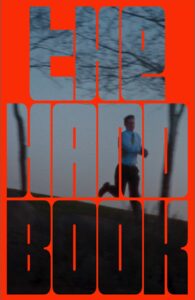 The Handbook. Brandon Carraway, director and screenwriter, Hannah Grace Carraway, screenwriter.
The Handbook. Brandon Carraway, director and screenwriter, Hannah Grace Carraway, screenwriter.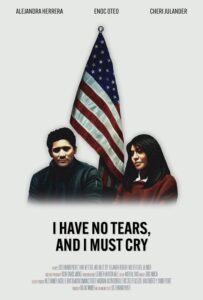 I Have No Tears, and I Must Cry. Luis Fernando Puente, director and screenwriter.
I Have No Tears, and I Must Cry. Luis Fernando Puente, director and screenwriter.
Maria Luisa is ready to escape immigration limbo, but when her green card interview takes an unexpected turn, she faces the anxiety of losing the life she had planned. Narrative short film.
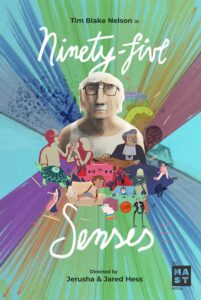 Ninety-Five Senses. Jared and Jerusha Hess, directors. Chris Bowman and Hubbel Palmer, screenwriters.
Ninety-Five Senses. Jared and Jerusha Hess, directors. Chris Bowman and Hubbel Palmer, screenwriters.
An ode to the body’s five senses, delivered by a death-row inmate with little time left to enjoy them. Actor Tim Blake Nelson and a diverse team of animators from Latin America and the U.S. bring to life this bittersweet tale of regret and redemption. Short animated film.
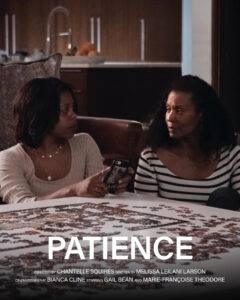 Patience. Chantelle Squires, director. Melissa Leilani Larson, screenwriter.
Patience. Chantelle Squires, director. Melissa Leilani Larson, screenwriter.
When COVID19 strikes, Sylvie finds herself at her mother’s door with nowhere else to go. Despite never quite seeing eye to eye, mother and daughter must find a way to wait things out—together.
Podcast
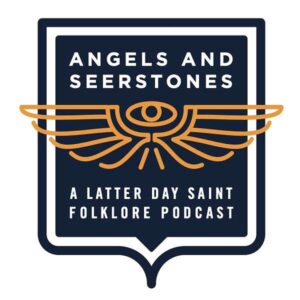 Angels and Seerstones: A Latter Day Saint Folklore Podcast. Christopher James Blythe and Christine Elyse Blythe.
Angels and Seerstones: A Latter Day Saint Folklore Podcast. Christopher James Blythe and Christine Elyse Blythe.
Latter-day Saints are a people of radical faith. Their tradition is one in which angels visit everyday people and sometimes men and women see the divine in stones. In this podcast we examine the lived religion of Latter-day Saints, the stories we tell, and the beliefs we debate. Join Christine and Chris Blythe, professional folklorists and LDS converts who openly profess their faith while exploring the traditions of their chosen people.
 Exponent II: The Podcast. Ramona M., Heather Sundahl, and Carol Ann Litster Young.
Exponent II: The Podcast. Ramona M., Heather Sundahl, and Carol Ann Litster Young.
The feminists who make up the Exponent II Community (comprised of no less than a Magazine, a Blog, and an Annual Retreat) invite you to listen, and to join in our lower-brow, fun conversations about the lives of the people of our community.
 Follow: A Latter-day Saint Poetry Podcast. Merrijane Rice.
Follow: A Latter-day Saint Poetry Podcast. Merrijane Rice.
Weekly poems and discussion inspired by scripture readings concurrent with the “Come, Follow Me” study schedule.
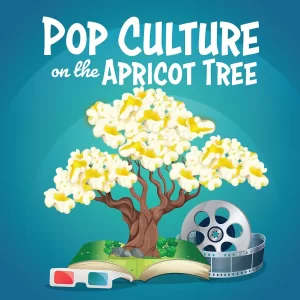 Pop Culture on the Apricot Tree. Liz Busby and Carl Cranney
Pop Culture on the Apricot Tree. Liz Busby and Carl Cranney
Pop Culture on the Apricot Tree is an LDS podcast dedicated to discussing pop culture from a Mormon perspective. We talk about great gospel insights through great stories and help you find entertainment that is both true and beautiful. We encourage our listeners to seek after everything virtuous, lovely, of good report or praiseworthy. The podcast is co-hosted by Liz Busby and Carl Cranneyand features rotating guests discussing popular media from a Latter-Day Saint perspective.
 Post-Mormon at the Movies. Dan McIntosh and Nick Thacker.
Post-Mormon at the Movies. Dan McIntosh and Nick Thacker.
Nick and Dan, a screenwriter and a movie-lover, explore themes of changing faith through the language of cinema. They discuss their journeys out of the Mormon church using film narrative in order to build understanding between believers, non-believers, and everyone in between.
Poetry
 Susan Elizabeth Howe. Infinite Disguises. BCC Press.
Susan Elizabeth Howe. Infinite Disguises. BCC Press.
In her introductory poem, Susan Howe invites readers to join in the “pleasure and play” of Infinite Disguises. Meet a meth child, Sulis Minerva, Della Street, and buckle up while Jesus drives a convertible. Her imagination runs wild, roller-coasting with witty, contemporary language through diverse and timely topics. She weaves this wonderful collection with inspiration from Emily Dickinson. Howe raises an eyebrow to America’s gods of money and self. Yet, Infinite Disguises holds at its earth-loving heart, “the worm’s quiet praise.” —Marilyn Bushman-Carlton
 Dayna Patterson. Oh Lady Speak Again. Signature Books.
Dayna Patterson. Oh Lady Speak Again. Signature Books.
The witchy, spell-soaked poems in Patterson’s second collection explore female characters from Shakespeare’s plays, with a feminist twist. The collection grapples with women’s roles in Shakespeare and in Mormon culture, both heavily influenced by patriarchal structures that often silence marginalized voices. If you’re not well-versed in Shakespeare or Mormonism, don’t worry—these poems will delight and enchant you with their own deep magic, their tremendous power, their singing. In these pages you’ll meet Cordelia, third wife of polygamous Lear. You’ll meet Miranda, sailing away from her father and his faith. You’ll encounter Ophelia, who enters an amphibious torpor when buried, and is reborn as forest ecologist, far from her father’s ghost. Lady Macbeth and the weird sisters get a retrial, and Juliet finds her way to a different ending. Shadowy goddesses like Hecate, mother of witches, are invoked and act within these pages. Rosalind from As You Like It is given the final word. These poems delve into faith crisis, queerness, abandonment, transgressive power, rebirth, and dream.
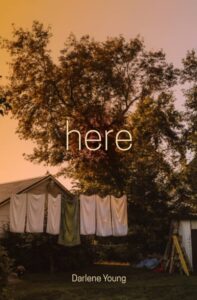 Darlene Young. Here. BCC Press.
Darlene Young. Here. BCC Press.
Darlene Young’s Here is a hymn to “this jumblesale world,” a journey into middle-aged motherhood, into empty nesting, into God. While a youngest son is on the cusp of manhood, and a mother who worries if she’s done enough to prepare him for life, God shows up each morning as dance partner and “jerks / his head meaningfully towards the dance floor.” Her response: a “hell yes.” The voice in these poems is often playful and laced with refreshing snark, such as when she says no to addressing God as “Thou” instead of “You” in her prayers. Other times the speaker’s voice is earnest-honest, such as when she considers her heartbreak over her son’s heartbreak: “Either way, / it’s you with your hand outstretched, / longing.” Here is hyper-aware of the moment, ultra-attentive to the now—at the cusp of letting grown children go, noting the body’s slow fumble into age—we’re reminded that all we have is fleeting, temporary, and therefore incredibly precious. We are gently transformed. —Dayna Patterson.
